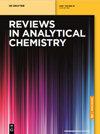基于超分子溶剂的重金属取样和富集微萃取技术综述
IF 3.8
3区 化学
Q2 CHEMISTRY, ANALYTICAL
引用次数: 16
摘要
即使是极低浓度的重金属污染物也会对环境和人体健康产生不利影响。因此,测定各种样品中微量重金属的浓度引起了人们的广泛关注。传统的重金属采样分析方法存在一定的局限性,包括基体的影响和检测限高。因此,使用各种方法对目标分析物进行预处理和浓缩,这些方法耗时,昂贵,并且需要使用有毒溶剂。近年来,超分子溶剂微萃取(SSME)作为一种绿色分析策略,已被用于测定各种基质中的低浓度重金属。该方法具有富集系数高、提取时间短、分析速度快等特点。此外,与其他方法相比,它消耗的化学试剂更少,因此具有成本效益。同时,该方法具有良好的灵敏度和选择性。在此,我们全面回顾了SSME技术在水、食物和生物样品中重金属分析的应用。此外,我们还介绍了SSME技术的独特特性,讨论了未来的挑战,并指出了潜在的未来趋势。本文章由计算机程序翻译,如有差异,请以英文原文为准。
Supramolecular solvent-based microextraction techniques for sampling and preconcentration of heavy metals: A review
Abstract Even very low concentrations of heavy metal pollutants have adverse effects on the environment and on human health. Thus, determining even trace concentrations of heavy metals in various samples has attracted a lot of attention. The conventional analytical methods used for the sampling and analysis of heavy metals have some limitations, including the effects of the matrix and their high detection limits. Thus, various methods are used for the pretreatment and concentration of the target analytes, and these methods are time-consuming, expensive, and require the use of toxic solvents. In recent years, supramolecular solvent-based microextraction (SSME), a green analytical strategy, has been used to determine low concentrations of heavy metals in various matrices. This method has unique features such as high enrichment factor, short extraction time, and rapid analysis. In addition, it is cost effective because it consumes less chemical reagents than other methods. Also, it is ecofriendly, and it has good sensitivity and selectivity. Herein, we presented a comprehensive review of the application of the SSME technique for the analysis of heavy metals in water, food, and biological samples. Also, we have provided the distinctive properties of the SSME technique, discussed the challenges that lie ahead, and addressed the potential future trend.
求助全文
通过发布文献求助,成功后即可免费获取论文全文。
去求助
来源期刊

Reviews in Analytical Chemistry
化学-分析化学
CiteScore
7.50
自引率
0.00%
发文量
15
审稿时长
>12 weeks
期刊介绍:
Reviews in Analytical Chemistry publishes authoritative reviews by leading experts in the dynamic field of chemical analysis. The subjects can encompass all branches of modern analytical chemistry such as spectroscopy, chromatography, mass spectrometry, electrochemistry and trace analysis and their applications to areas such as environmental control, pharmaceutical industry, automation and other relevant areas. Review articles bring the expert up to date in a concise manner and provide researchers an overview of new techniques and methods.
 求助内容:
求助内容: 应助结果提醒方式:
应助结果提醒方式:


